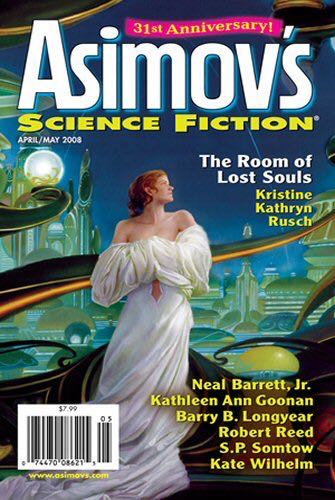Asimov's Science Fiction, April/May 2008
240 pages
My March 2008 issue of Asimov's apparently never reached me. I only noticed this fact now--two years too late to complain to Asimov's or to Regal Publishers' Services, the company that manages my subscription. Or rather, that company that used to mismanage my subscription. Gah. I'm through dealing with this. My subscription has long since lapsed, and this April/May double issue is the final issue of Asimov's that I will read. No more disappointing magazines stuffed full of incomprehensible fantasy drivel.
Sure, there are some good stories that I'll miss. I enjoyed The Room of Lost Souls in this issue, but that was really the only good story. An Alien Heresy was intriguing, but the author--though he tried--never convinced me that it was anything more than an anti-religious screed.
- Novella: The Room of Lost Souls, by Kristine Kathryn Rusch - Sequel to Diving Into the Wreck. Our narrator accepts a job to explore the Room of Lost Souls on an abandoned space station, a room from which nobody but our narrator has ever returned alive.
- Novelette: Memory Dog, by Kathleen Ann Goonan - A confusing story told from the point of view of a dog who happens to be the memory repository for Mike, the ex-husband of the dog's owner.
- Novelette: An Alien Heresy, by S.P. Somtow - A medieval priest burns an alien at the stake for the heresy of denying Christ.
- Novelette: Strangers When We Meet, by Kate Wilhelm - An accident leaves Rebecca without the capacity to form new memories, making her the prize subject in professor Edith's memory research, the object of Keith's romantic attentions, and a prime candidate for secret, unethical government experiments.
- Slidin', by Neal Barrett, Jr. - In a post-apocalyptic world full of mutants, a genetically normal child is a threat that must be extinguished.
- The House Left Empty, by Robert Reed - After the collapse of the federal government, self-governing communities keep the social order in their own neighborhoods. A mail delivery to a vacant house leads the neighbors on a search to find the owner and deliver the package.
- An Almanac for the Alien Invaders, by Merrie Haskell - An archaeologist colludes with alien invaders to loot Earth's artistic treasures and send them off to museums on other worlds.
- An Art, Like Everything Else, by Nick Wolven - Stupid stupid stupid. Even in a simulated reality, death is so hard to face that our protagonist (hero would be a misnomer) cannot let go of his lover, thereby preventing him from dying.
- Ghost Town, by Catherine Wells - A miscalculation about the time dilation effects means that Kaye loses 14 years of subjective Earth time on her deep space trip. Apparently, 14 years is enough to make her an alien and a stranger when she arrives back home. I don't believe it; a decade and a half is a long time, but not that long. The culture doesn't change in 14 years.
- Another Country, by Matthew Johnson - Temporal fissures allow refugees from the past to show up today. But what does the modern world have to offer a Roman boy who cannot fulfill his manhood in this emasculated culture?
- The Advocate, by Barry B. Longyear - A doddering amnesiac uploads his memory pattern to an advocate body, so that the advocate can take care of day-to-day stuff while he spends his time writing.
